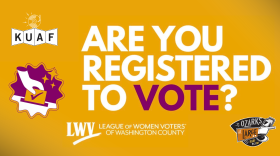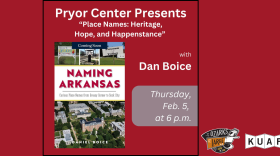Kyle Kellams: This is Ozarks at Large. I’m Kyle Kellams.
We're talking a lot about the value of public radio this week, and we thought we’d turn to someone who’s been part of public radio and NPR for about four decades. Scott Simon began hosting Weekend Edition on Saturday mornings in 1985, and he says there are a couple of important reasons he’s stayed with the job.
Scott Simon: I love the work. I love the opportunity that we have to get together with people every week to not just tell them what happens, but give them a whole range of experience in any given hour. And of course, there are exceptions in times of great national emergency, and nothing takes a back seat to the most urgent and breaking news. But I think we keep a relationship going with the audience because it's not just about the news. It's about literature. It's about the arts. It's about hearing from interesting people. It's about having a conversation. It's about some of the regulars that we have on our show, and you keep connecting with them. I think we're very lucky to be able to have a program that is an appointment. As I keep hearing about it, it's a weekly appointment that millions of Americans have, and we just feel very blessed to be able to continue to do that work.
Kellams: You mentioned the word “relationship,” and I think that's something that has developed. There are millions of people who listen to you now who’ve listened to you over the last several decades. Most of them, of course, you'll never get to meet. But do you get a sense that there is this sort of one-on-one relationship with those millions?
Simon: I hear about it every day. And by the way, almost every day, even in these work-from-home days, I run into people who tell me that. Yes, absolutely. Sometimes I don't enjoy hearing from them—but no, I really do.
It's always very difficult when they say, meaning only to be nice, “Oh, I practically grew up with you.” But I take that for the compliment that it is.
I hear from people. The emails and on social media platforms, those messages come in every day. And it's very nice because we understand, because of the long relationship we've had, we occupy a certain position in the lives of people. And that, to me, is very important. It really is a relationship, and I really do feel that it goes back and forth.
Kellams: In 2025, people can find whatever media outlet they want, and they can just drill down. If you only want to know about Belgian soccer, you could spend all day doing that.
Simon: Do you have that website name? I got to find that.
Kellams: But what I love about Weekend Edition—as well as other NPR shows—is there's still the element of surprise. If I’m listening at ten after the hour, I don’t necessarily know what’s coming up at twenty after. It may not have been something I ever sought out, but now I’m richer for hearing it.
Simon: I think that's important. I think that's an important ingredient in what we do for the American public. We surprise them.
As you say, you can find what you think of as almost any media outlet. You can find anyone to agree with you, and there are a lot of people that seem to go in search of that.
What I particularly take pleasure in is the fact that we are in a position to surprise people. We are in a position—and work at this—to be able to say, look, I know this is something that you felt you understood and you know how you feel about it, but here's some information that maybe you didn't have. Or here's a different vantage point, here's a different voice, here's a different viewpoint. And I find that to be some of the most valuable work that we do.
Kellams: We in this job—we use audio. I know there are videos now, and there are other sorts of ways to get a message across. But something that's been happening for a century now is audio. And I think there is still power in just the voices or the sounds that you hear coming through a speaker.
Simon: Yes, I think so. And that enables, I think, the specific and very personal relationship that we have with people, because we are company.
We are a source of information and enlightenment, but we are company. People can take us along. We become part of their lives. As I keep hearing—driving kids to soccer practice, driving kids to hockey practice, early on Saturday mornings, driving the family to synagogue—we go along with people.
We're part of their breakfast. We're part of getting up. We're part of, I think, some of the most important and daily episodes in their lives. And that creates a kind of intimacy. And again, a relationship that goes back and forth.
We're with people early in the morning before sometimes they get to see anybody else. But our voices are present in their lives. And I do think with the voice, there's an aspect of concentration. There's an aspect of taking the voice into yourself and running it through your mind that I think encourages a very special relationship. You're not watching, you're absorbing.
Kellams: You're often talking with musicians or authors—people that can enlighten us. But you also often have to talk about conflict and violence. I get the sense that you and your colleagues and your staff are aware of the tone of a Saturday morning, even when you're talking about something that could be heartbreaking.
Simon: Yes. That's important. I think you have to take care.
I think you have to understand that often the whole family is listening, and we want to be able to deliver information that is important to hear, but in a way in which it will be received.
We want to respect the fact that it's a Saturday morning and family time together. And gosh knows, we don't take a step back when it comes to having to bring up important—but often quite sad and distressing—information to people.
But we also want to do it in a way that people are prepared to accept it and think about it.
Kellams: I know that you're a baseball fan. I’m a big baseball fan. Throughout summer, if you've got a favorite team, the best way to experience baseball—if you can't go to the ballpark—is on the radio. And it feels like you become friendly with your favorite team’s play-by-play announcer. And I think there's some of that with you and other NPR voices, that you've just been there with us for a long time. And there is a—can I say—friendship that develops?
Simon: Sure, sure. Absolutely. That's how we think of it, too.
I think it's absolutely the case. And I think, for example, although you and I have never met—right, right, right—although you and I have never met, I think we have a kind of similarity of experience that wouldn't prevent us from hailing each other as friends immediately.
And I think that is true of a lot of our listeners, because we have—look, we have shared a lot of history together. We've shared a lot of experiences together. People have heard me crack up on the air and cry on the air and certainly laugh on the air. And I think these are the kind of experiences that you have with friends.
And I'm able to hear from them, thanks to so much of the technology that exists today. And I'm grateful for that.
Kellams: Scott Simon, thank you for a few minutes of your time. I look forward to being with you next Saturday morning.
Simon: Thank you. We'll look forward to that, too. Best to everyone in Fayetteville.
Kellams: Scott Simon, host of NPR’s Weekend Edition every Saturday morning. Our conversation took place yesterday morning.
Ozarks at Large transcripts are created on a rush deadline. Copy editors utilize AI tools to review work. KUAF does not publish content created by AI. Please reach out to kuafinfo@uark.edu to report an issue.








